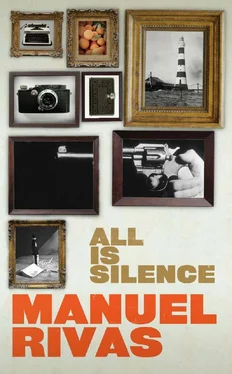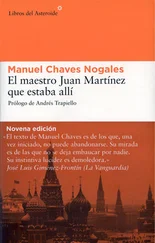She did what Fins least expected. She burst out laughing. ‘A secret agent? There’ll be lots of those!’
Fins now, for her, was the memory of an outing. Nothing more. Lucho Malpica, a child who was yet to be born. And Noitía, a nightmarish place, a place she’d gone to one day to buy thread and been attacked by a storm. She was behind him, calm, unconcerned, with her cushion, teaching her carer the secret art of making lace. He stood staring at the sea through a large window which let in the combined sound of the waves’ hiss and the seagulls’ scream. He’d have loved to draw the curtain. Cover that vision. He couldn’t understand people who found gazing at the sea restful. For him it was deeply disturbing. He couldn’t bear to be alone with the sea for more than five minutes. And it seemed the feeling was mutual. He was sure its mood changed and it grew angry whenever he stood looking at it.
Diving was something else. When you were inside the sea, that was different. The only way to understand the sea was by getting wet. Surveying the underwater forests of kelp, sea lettuce, thongweed, bladderwrack, toothed wrack, knotted wrack, sea fans, sugar kelp, purple seaweed such as carrageen or Irish moss. Sailing, on the surface, he got seasick, felt as if he was dying. He sneezed, spat, drawled, coughed up his lungs, liver, prefixes, saliva, interjections, onomatopoeias, phlegm, tubercles, roots, bile, the inaccessible; the worst thing was throwing up what came after the void, after air, all of it yellow, the sky, sea, skin, the back of the eyes, the soul. Except when he was rowing. If he was rowing, and the more energy he put into it the better, with his back towards his destination, there was a temporary suspension of the disease. But he had to make sure he kept going.
He closed the window of the room and all he could hear was the unmistakable knocking of the boxwood needles. They were in a home for old people and not such old people with Alzheimer’s. Amparo’s illness was something else. She was convinced she could remember everything.
‘Poor things! They sometimes forget their own names. I’m the one who has to remind them.’
She tapped her forehead with her index and middle fingers. ‘It’s all in here!’
Next to Amparo was her carer, a young and kind girl.
‘Her hands get more and more agile,’ she said. ‘Look at them. It’s as if the skin is smoother and her hands move more quickly. Good hands for making lace, aren’t they, Amparo? And who’s this little marvel for?’
Amparo Malpica stared through the large window with melancholy.
‘It’s for my son. For when he’s born.’
The neuropsychiatrist had said, ‘Her mind has suppressed a time that hurts her. Her illness is a property. The property of erasing a period of her life. Or at least erasing it as an explicit memory. Something we call retrograde amnesia.’ The period she’d kept alive was precisely her experience as a girl, before she left Uz and went to live with Lucho in the seaside house in A de Meus. Fins knew the dynamite had exploded not only on the boat. His mother, in her own way, had put an end to a life that included him. But seeing her there, physically well, with her agile fingers, that fertile gaze, dispossessed of the fears that used to hold sway over her, knowing her name, smiling at anyone passing by, he couldn’t help feeling annoyed.
‘So what you’re saying is she forgets what she wants to forget?’ he asked reproachfully.
Talking to Dr Facal, he had the impression that he was before the sea and the sea was stronger than him.
‘No. Memory is often painful. She’s gone past the limit of pain. In order to survive, her mind has rejected the bit that’s hurting her. Memory has these strategies. She could have chosen a different path. But she’s chosen this one. We’ll never fully understand why.’
‘Is it reversible?’
The doctor took her time. In Fins’ experience, he knew that if the answer was positive, he’d have been told it already.
‘The truth isn’t always pleasant,’ she said eventually.
And this was the truest thing he’d hear in a long time.
‘ISN’T THAT THE son of Malpica, the one who died using dynamite?’
They gazed from the sea. Used to seeing from the outside in. From west to east. From darkness to dawn. From mist to morning. At varying depths. Several of them half submerged, the water around their waists. They moved like amphibians, with effective slowness, overcoming hydraulic resistance with their home-made diving suits of waterproof clothing over wool, their whole bodies like pistons plunging down, digging, scratching, harvesting the sea with ancient implements, long-handled hoes, rakes, forks. Their heads covered in an array of scarves and hats.
These women had been his world. They’d all passed through it. Guadalupe, Amparo, Sira, Adela, Belvís’ mother, Chelín’s mother, even Leda, with their buckets full of cockles and sacks of clams.
‘It is. I heard he studied to become a policeman.’
‘Do you have to study for that?’
‘It all depends… Not if you want to walk around with a truncheon in your hand, like your husband.’
‘That’s right, woman!’ The gatherer of shellfish gestured with the rake between her legs. ‘I bet you wish your husband had a truncheon like mine!’
They all burst out laughing.
‘Go wash out your mouth!’
‘Leda… she’s a clever one.’
The shellfish harvesters resumed their work. In search of molluscs, their bodies transformed themselves into strange, prehistoric monsters.
‘They say he’s going to be an inspector, a secret investigator.’
‘It can’t be that secret if you know all about it!’
‘That’s what I heard. Doesn’t bother me! He can be an astronaut for all I care.’
‘Oooh, an astronaut would be nice!’
The women’s voices and laughter combined at that hour with the sea’s phonemes, the screeching and splashing, greedy warnings of vigilant birds. Fins couldn’t help himself. He took a photograph. Just one. And withdrew like a poacher.
In front of the house in A de Meus, the hand on the door, calling outwards. Inside what gave him the warmest welcome was the oilskin tablecloth, on which stood an abandoned bottle, with a trail of wine like a tidemark. At dusk Fins wandered along the coastal road. Stopped at Chafariz Cross, where he used to wait for the bus. Stuck his hands in his trouser pockets. A normal man should always have some spare change. He hesitated. He had a good excuse for staying where he was. But by the time he realised, his feet had already transported him to the door of the bar. He could hear the hustle and bustle of a Friday night.
Without touching the door handle, he moved to one side and peered in. The luminous novelties of the Rock-Ola and game machines.
Behind the glass, in that large belljar, memory fermented. Life twisted and turned to the sound of music. With him on the outside.
Rumbo was filling glasses on a tray placed on the counter.
A little further down, on the other side of the counter, Leda and Víctor. He was sitting on a tall stool with a glass in his hand, looking serious. She was standing up, playing with her finger at curling the taciturn man’s hair. At that point the mocking, seductive gesture was the centre of the world. A gesture he recognised, which said, ‘Where are you?’
Leda turned to heed Rumbo’s call. Fins could see her face to face. The pottery of time had improved any memory. He was afraid he might be seen, he who was an expert in angles of shade. A specialist in shade. He could measure the textile thickness of shadows. There were shadows of satin, wool, cotton, nylon, polyester, velvet. Transparent. Waterproof. But when he peeped in again, she had her back to him, with the tray in her hand. From the eye of the catafalque, life became painful again. People were coming. He ran away from their intrusive radiance.
Читать дальше












